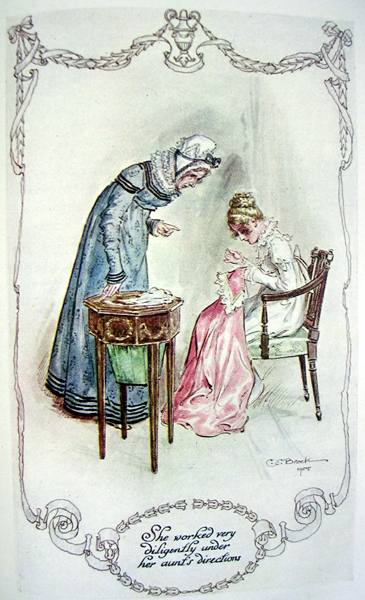Reading and handwork make a perfect pair, in my opinion: the two things I enjoy doing most, miraculously combined. Sometimes I even enjoy the reading more than actually doing the thing itself. And on those occasions when a project outlasts enthusiasm, what better to rekindle the fires than finding the same spark in a book?

Happily, literature is full of examples of hand-workers – particularly in those classics which were written in the days when handwork for women was just ‘work’ and everyone (unless a gentleman of the purely decorative class) was expected to keep themselves busy.
So it is with the Dashwood girls in Sense and Sensibility. “Sir John Middleton, who called on them every day for the first fortnight, and who was not in the habit of seeing much occupation at home, could not conceal his amazement on finding them always employed.”
Or take Mansfield Park, also by Jane Austen. One of her more underrated books, I feel, with one of her more underrated heroines. Fanny is always busy with handwork: her own, or someone else’s. Helping Aunt Bertram the indolent, or being press-ganged into the thrifty machinations of Aunt Norris. And unlike her cousins, she does work of a high calibre.
 Then there are the March girls in Little Women, who ” adopted Jo’s plan of dividing the long seams [of sheets] into four parts, and calling the quarters Europe, Asia, Africa, and America, and in that way got on capitally, especially when they talked about the different countries as they stitched their way through them.” The book also includes knitting, dressmaking (for humans and dolls), and the embroidering of a pair of slippers (“grave yet cheerful pansies on a deeper purple ground”).
Then there are the March girls in Little Women, who ” adopted Jo’s plan of dividing the long seams [of sheets] into four parts, and calling the quarters Europe, Asia, Africa, and America, and in that way got on capitally, especially when they talked about the different countries as they stitched their way through them.” The book also includes knitting, dressmaking (for humans and dolls), and the embroidering of a pair of slippers (“grave yet cheerful pansies on a deeper purple ground”).
Not all literary hand-workers are enthusiastic. Catherine, from Catherine, Called Birdy by Karen Cushman, is continually being nagged by her old nurse Morwenna to work on her spinning, sewing, embroidery and the like, when she would rather be running wild outside. “They found the remains of several spindles, many skeins of wool, and an unfinished tapestry in the muck from the privy. Why is everyone so certain they are mine?”

Other fictional handworkers include Miss Silver, who is always knitting something, usually for her great-niece or great-nephews, and who designs and executes her own crochet trimmings to boot. Miss Marple also knits, but in less detail. Devotées (or, indeed, devotés) of quilting can enjoy the works of Jennifer Chiaverini and Earlene Fowler. Embroiderers, or those considering taking up embroidery, should make a beeline for Embroidery Mary.
On the non-fiction side, there are plenty of books about the history and practice of various crafts, and then there are books of craft humour. Stephanie Pearl-McPhee is an outstanding outlier in this field.
For those who are passionate about both literature and craft, there are books of crafts inspired by books, which you can add another layer to by making the crafts from the books of crafts inspired by books. While reading the originatory books, if you want to complete the circle and you have the much-desired (by me at least) ability of reading while working with your hands.
 Alternatively, you can follow the grand old tradition of having one person read while everyone else handworks; or its modern, more solitary equivalent: the audio book.
Alternatively, you can follow the grand old tradition of having one person read while everyone else handworks; or its modern, more solitary equivalent: the audio book.
What are some of your favourite handworky books? Recommendations eagerly sought!






